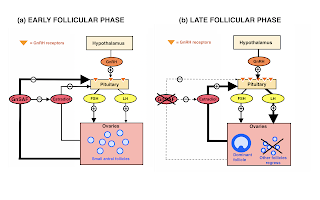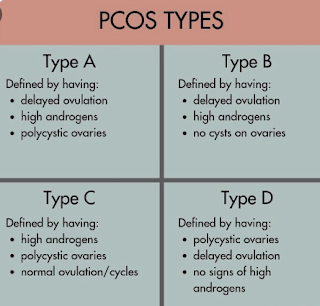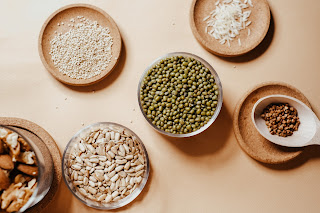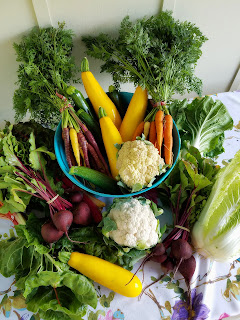Hello there, Beautiful buddies! I'm back with another critical blog post. I'm going to talk about polycystic ovarian syndrome, also known as PCOS. Did you know that this is the most common illness found in women all over the world? Do you have this problem?
 |
| PCOS: |
Have you noticed that you are gaining weight for unknown reasons? Did you experience irregular periods, hirsutism, acne, hair loss issues, as well as fatigue? Are you becoming depressed for an unknown reason? Do you suffer from mood swings and depression on a regular basis? Did you always feel sleepy after getting a good 8 to 10 hours of sleep? There's no need to be concerned about these issues any longer. Breakfastie buddies are always there to help you manage this situation.
It is a hormonal imbalance and metabolic disorder that affects women. The polycystic ovarian syndrome affects nearly one in every ten adolescent girls and young women. This is a hormonal imbalance in which the ovaries produce an excess of male hormones such as testosterone.
After my careful observation, I will explain how you can manage your PCOS symptoms by incorporating healthy foods into your diet? Breakfast top 6 healthy foods that will greatly assist you in managing your polycystic ovarian syndrome. Everyone understands how important food is in our lives. It provides us with a variety of nutrients, vitamins, and minerals that are essential for our bodies to function properly.
After being diagnosed with polycystic ovary syndrome, the first step should be to make the necessary dietary changes. Medication can help, but diet and lifestyle habits are more important. Weight loss is the ultimate goal of a PCOS diet.
Have your checkout is our blog post on healthy fat-burning foods for ladies?
Many studies show that we can manage our symptoms by making dietary changes and that this is the most effective way to cure it. Everyone understands how important food is in our lives. It provides us with a variety of nutrients, vitamins, and minerals that are essential for our bodies to function properly.
In this article, we'll go over the top 6 healthy foods that can help you fight and get out of these situations. But first, we will understand what actually PCOS is? How many types, symptoms, and many more things...
Polycystic ovarian syndrome (PCOS) and Its Symptoms.
A polycystic ovary syndrome is a group of symptoms, not a disease or a set of unknown causes. Many PCOS patients are overweight or obese, and it is one of the most common hormonal issues in young women during the menstrual cycle. GnRH is produced by the brain and is released into a special circulation that travels to the pituitary gland, which then produces two hormones, FSH and LH, which travel in the bloodstream to the ovary and cause the ovary to produce an egg.
 |
| PCOS Mechanism: |
The egg will then travel to the uterus and, if fertilized, will remain there; if not, it will be shed, and the woman will experience a normal menstrual period. One of the primary abnormalities in PCOS, we believe, is the abnormal release of GnRH, which, instead of being released cyclically, is released rapidly throughout the day, disrupting the release of LH and FSH.
In the peripheral circulation, LH is increased, but FSH is decreased; as a result, the ovary produces more male hormone testosterone or androgens, and ovulation is inhibited. Women suffering from PCOS may experience a variety of symptoms, the most common of which are unpredictable and irregular menstrual cycles.
According to studies, one out of every ten women has this condition. Diabetes, depression, cardiovascular disease, and an increased risk of cancer are all risks associated with it. PCOS has no known cause, but symptoms include pelvic pain, hair thinning, weight gain, unwanted hair growth, infertility, and menstrual cycle irregularity.
Types of Polycystic ovarian syndrome:
 |
| Types of PCOS |
Top 6 PCOS Friendly Healthy Foods that help you manage your PCOS:
Here is a complete list of healthy foods that help you to manage your illness:
- Wholesome foods
- Healthy fats
- Organic Meat
- Low GI Food
- Protein Rich food
- Anti-Inflammatory food
Are whole foods healthy? What about anti-inflammatory foods?
What is the importance of physical activity? We're talking about all of this and more.
1. Eat wholesome foods:
If you have PCOS, you should eat whole foods. These whole foods have high fiber content and a low glycemic index. These whole foods require more time to be metabolized by the human body. The amazing thing about whole foods is that they are slowly absorbed into your bloodstream and require very little insulin to process.
Many studies have found that eating more whole grains reduces the risk of PCOS by 64%. As a result, insulin production will be reduced. When our bodies produce less insulin, testosterone production decreases. Whole foods like healthy oils, fish, seeds, nuts, vegetables, and fruits can be part of your diet.
Which of these whole foods do you prefer? Does it make you feel better? Leave a comment to start a conversation with your breakfastie buddies...
2. Add Healthy Fats into Your Diet:
If we eat healthy fats for breakfast, we will feel fuller for a longer period throughout the day. They can also help to keep the glycemic index of the foods you eat the rest of the day low. Polycystic ovarian syndrome can cause mild inflammation, increasing the risk of type 2 diabetes, cardiovascular disease, and other serious health issues. Have you checked our post Top 12 Healthy Breakfast Ideas for Diabetes Patients?
Healthy fats should be included in your PCOS diet because they have been shown to reduce inflammation in the body. Whole eggs, chia seeds, dark chocolate, coconut, extra virgin olive oil, avocados, and fatty seafood are all good sources of healthy fats.
3. Organic Meat:
Organic Meat is perfect for you if you are suffering from PCOS. Plant-based meat has fewer hormones, and livestock fed genetically modified nutrients are less likely. Modified meals often contain pesticides when fed to conventional livestock, making hormone management problematic. They can potentially exacerbate PCOS symptoms.
Organic dairy products, such as natural yogurt, are excellent for women with PCOS, in addition to organic meat. They're full of beneficial bacteria. Every day, add at least one dish of organic meat to your healthy diet. One serving is the size of a palm-sized piece of chicken or fish. If you like, you can add 3/4 cup tofu as well. The finest choices are salmon, skinless chicken, and tuna.
Don't forget to eat your meals. At least three times a day, at appropriate intervals, should be consumed. If you get hungry in between meals, reach for nutritious snacks like plain yogurt, low-fat crackers, or fresh fruit.
4. Low GI Foods:
The glycemic index assigns a value to foods based on the rate at which your blood sugar is rising. Foods with a low glycemic index are those that do not cause a significant increase in insulin levels. They are generally unrefined and unprocessed, with high levels of vitamins, minerals, and fiber. Avoid foods with added sugars if you are planning a PCOS diet.
These foods have the potential to increase the glycemic load. According to research, low glycemic foods help with weight loss, which is a major concern for women with PCOS. Legumes include chickpeas, carrots, organic fruits, and beans. Breakfast cereals containing bran, avocado, broccoli, and green vegetables are low on the glycemic index.
5. Protein-Rich Foods:
Protein-rich foods like peanut butter, avocado, beans, eggs, and tofu are necessary components of a healthy PCOS diet. When high protein foods are combined with carbohydrates, carbohydrate absorption is slowed, resulting in lower insulin levels. For example, if you like rice, try balancing it out with beans or a little avocado. Remember that polycystic ovary syndrome, like any other disease, responds favorably to healthy lifestyle choices.
As a result, exercise and regular physical activity are just as important as diet.
6. Anti-inflammatory foods:
Red wine can be consumed in moderation as well. If you like meat, cold-water fish like salmon or sardines can be a good option. Spices and herbs are also anti-inflammatory, so use them to make your meals more flavorful.
Hey! Beautiful ladies. Are you looking for 11 healthy Breakfast Foods for Young and Healthy Skin?
Bonus Health Tip to manage your PCOS Symptoms:
Many women are conscious about including fruits in their PCOS diet. This is because they have high sugar content. Fresh fruit, on the other hand, can be a healthy substitute for fried snacks if consumed in the proper quantities. Fruits are essential for giving your body the nutrients it needs to combat PCOS symptoms.
 |
| Healthy PCOS Diet: |
Don't forget to try out new healthy cooking techniques. This way, you'll get the most out of your PCOS diet. Try baking, grilling, microwaving, or steaming instead of deep-frying and roasting.
If you have polycystic ovary syndrome or any of its symptoms, you may become irritated. Taking the necessary steps to improve your health will not only boost your mood but will also help you reverse your symptoms. Making a good/bad food list and sticking to it is advised by experts. Consume unprocessed, whole grain bread and cereal to keep your hormone and sugar levels in check.
Consult your gynecologist if your symptoms continue to bother you. They can easily advise on the next steps. You can make a variety of tasty meals for yourself using PCOS-friendly ingredients.
Do you or someone you know suffer from PCOS? Please leave your thoughts in the section below!




Nice research work keep it up
ReplyDeleteNice research work keep it up
ReplyDeleteVery informative, covered all the important aspects.
ReplyDeletePCOS awareness is very essential.
Thank you for sharing such a fabulous information.